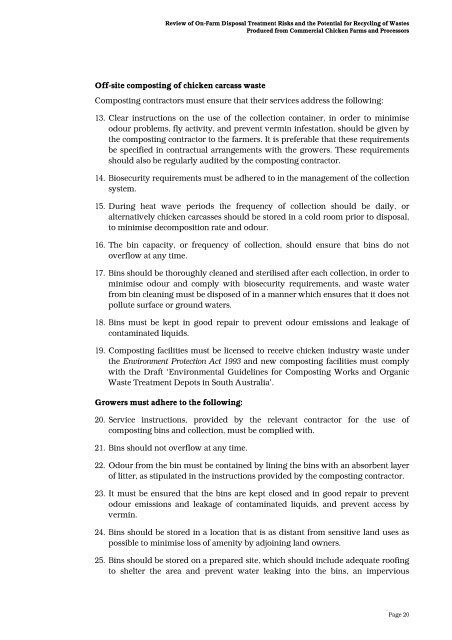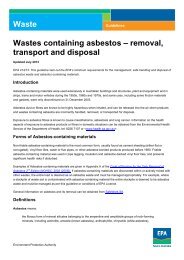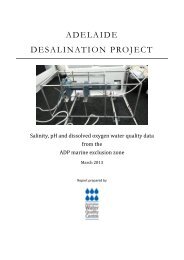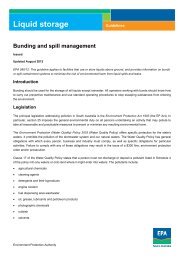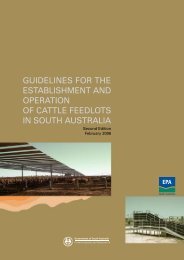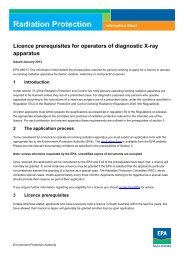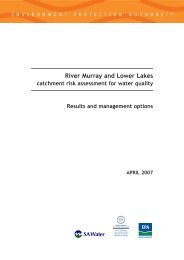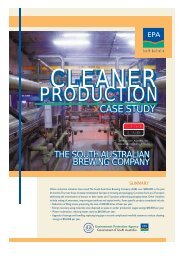Commercial Chicken Farms and Processors - EPA
Commercial Chicken Farms and Processors - EPA
Commercial Chicken Farms and Processors - EPA
You also want an ePaper? Increase the reach of your titles
YUMPU automatically turns print PDFs into web optimized ePapers that Google loves.
Review of On-Farm Disposal Treatment Risks <strong>and</strong> the Potential for Recycling of Wastes<br />
Produced from <strong>Commercial</strong> <strong>Chicken</strong> <strong>Farms</strong> <strong>and</strong> <strong>Processors</strong><br />
Off-site composting of chicken carcass waste<br />
Composting contractors must ensure that their services address the following:<br />
13. Clear instructions on the use of the collection container, in order to minimise<br />
odour problems, fly activity, <strong>and</strong> prevent vermin infestation, should be given by<br />
the composting contractor to the farmers. It is preferable that these requirements<br />
be specified in contractual arrangements with the growers. These requirements<br />
should also be regularly audited by the composting contractor.<br />
14. Biosecurity requirements must be adhered to in the management of the collection<br />
system.<br />
15. During heat wave periods the frequency of collection should be daily, or<br />
alternatively chicken carcasses should be stored in a cold room prior to disposal,<br />
to minimise decomposition rate <strong>and</strong> odour.<br />
16. The bin capacity, or frequency of collection, should ensure that bins do not<br />
overflow at any time.<br />
17. Bins should be thoroughly cleaned <strong>and</strong> sterilised after each collection, in order to<br />
minimise odour <strong>and</strong> comply with biosecurity requirements, <strong>and</strong> waste water<br />
from bin cleaning must be disposed of in a manner which ensures that it does not<br />
pollute surface or ground waters.<br />
18. Bins must be kept in good repair to prevent odour emissions <strong>and</strong> leakage of<br />
contaminated liquids.<br />
19. Composting facilities must be licensed to receive chicken industry waste under<br />
the Environment Protection Act 1993 <strong>and</strong> new composting facilities must comply<br />
with the Draft ‘Environmental Guidelines for Composting Works <strong>and</strong> Organic<br />
Waste Treatment Depots in South Australia’.<br />
Growers must adhere to the following:<br />
20. Service instructions, provided by the relevant contractor for the use of<br />
composting bins <strong>and</strong> collection, must be complied with.<br />
21. Bins should not overflow at any time.<br />
22. Odour from the bin must be contained by lining the bins with an absorbent layer<br />
of litter, as stipulated in the instructions provided by the composting contractor.<br />
23. It must be ensured that the bins are kept closed <strong>and</strong> in good repair to prevent<br />
odour emissions <strong>and</strong> leakage of contaminated liquids, <strong>and</strong> prevent access by<br />
vermin.<br />
24. Bins should be stored in a location that is as distant from sensitive l<strong>and</strong> uses as<br />
possible to minimise loss of amenity by adjoining l<strong>and</strong> owners.<br />
25. Bins should be stored on a prepared site, which should include adequate roofing<br />
to shelter the area <strong>and</strong> prevent water leaking into the bins, an impervious<br />
Page 20


